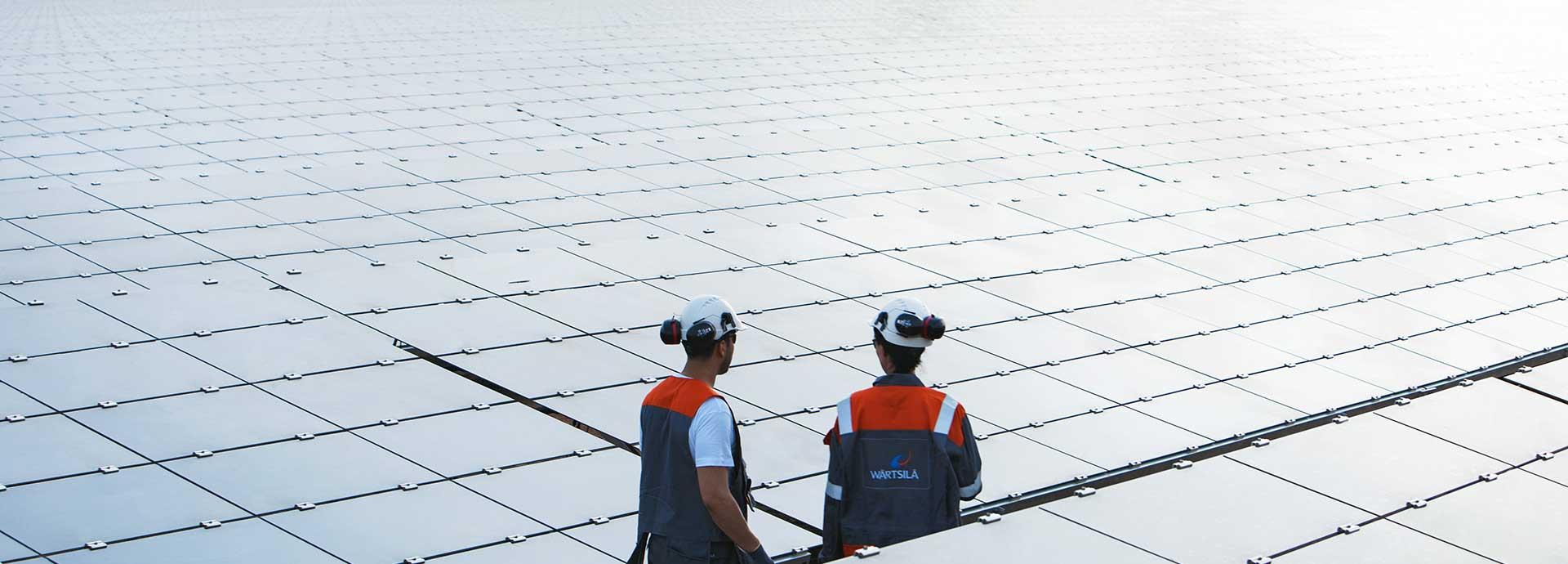

The idea of a sustainable society is simple enough: Clean air and water; people living in harmony with the environment; consumer items recycled as the raw material for new products; fossil fuels are a thing of the past, and people live and work in a connected world.
But building this society is a daunting task. It will require a radical shift in thinking to prioritise this harmony; clean, renewable fuels to replace the old forms of energy; and secure technology for the digital processes that connect us.
“For me, a sustainable society is one where people have learned to appreciate the value of the planet and its resources,” says Andrew Calzetti, Marketing Director at Wärtsilä Marine Business. “We don’t just take from the planet but add to it for future generations.”
Sourcing and storing energy
New forms of energy and energy storage will be critical as we transition away from fossil fuels.
“The prices for renewable energy have fallen so much that in many cases they are now one of the cheapest options for electricity,” says Tommi Rintamäki, Senior Manager, Power-to-X at Wärtsilä Energy Business. “Renewables are becoming the new baseload, but we need new balancing power to supply energy when it is needed, and renewables can’t provide it.”
Wärtsilä’s Power-to-X is one project that can help with this balancing. Power-to-X is a process to convert energy and store it in a new form to be used later. For instance, excess renewable energy can be used to combine hydrogen extracted from water and CO2 captured from the air to create renewable synthetic fuel. This fuel can then be used in, for instance, ships or power plants.
“We believe clean, renewable, synthetic fuels are necessary for a sustainable society, and we already have a good technical foundation with Power-to-X. Now we need to increase efficiency and scale it up to industrial size,” Rintamäki says.
Improved quality of life
Scaling up while managing the earth’s resources to provide for sustainable growth will require a significant reorientation of thinking.
“Don’t confuse quality with convenience,” Calzetti warns. “Convenience is a frozen, microwavable meal wrapped in petroleum-based plastic. Quality is a meal you make with your own hands out of fresh ingredients that were transported to your city by sustainable shipping. Yes, we can improve our quality of life in a sustainable society, but quality comes with costs, and we need to transition through a period of inconvenience.”
Fortunately, new digital solutions are frequently being developed that can get us through this inconvenience and bring us closer together.
The expansion of integrated ecosystems will be critical to the sustainable societies of the future. For example, Wärtsilä’s Smart Technology Hub in Vaasa will be an innovation and production ecosystem. The company also initiated the Maritime Cyber Emergency Response Team (MCERT) so the maritime industry can work together to meet cyber threats.
Working for a sustainable society
Digital solutions are only as effective as they are secure, says Teemu Eronen, Director, Cyber Operations at Wärtsilä.
“All data has to be trustworthy. It can’t be manipulated or corrupted for us to enjoy the benefits of digitalisation. By one estimate, cybercrime damages currently cost the global economy USD 1.9 trillion, and this is expected to rise to USD 6 trillion by about 2022. This is a huge challenge which we have to meet. Wärtsilä is committed to building cybersecurity as a core competency and competitive advantage,” Eronen says.
Wärtsilä’s vision for the future is a carbon-neutral, sustainable society where people enjoy high living standards. This can be achieved by green shipping and power enabled by safe and secure digital solutions. It is not easy, but it is attainable.
“I am proud and inspired by our vision of a sustainable society powered by 100% renewable energy. It touches me on a personal level,” Calzetti says. “However challenging this seems, I am encouraged that it inspires everyone in our organisation. All of these solutions we are developing ultimately has this common goal in mind.”
Did you like this? Subscribe to Insights updates!
Once every six weeks, you will get the top picks – the latest and the greatest pieces – from this Insights channel by email.


